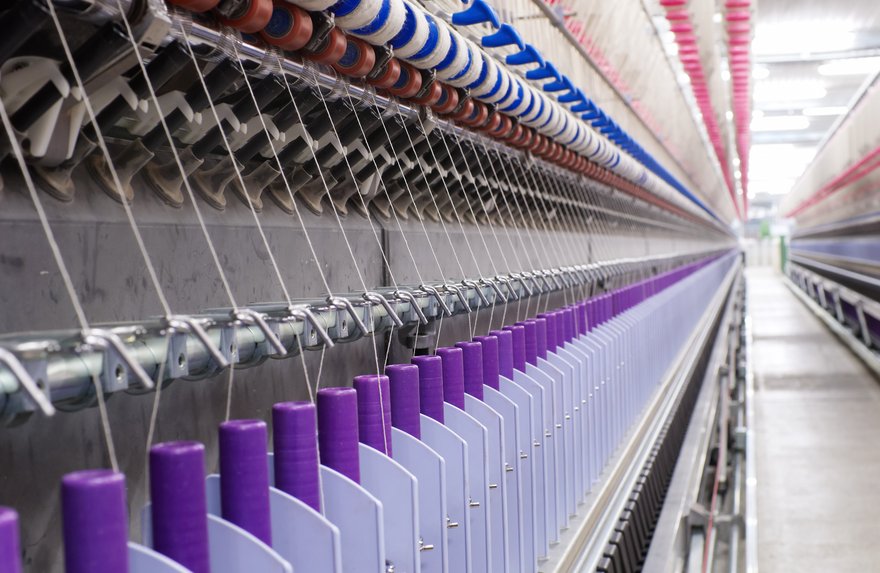Data from the U.S. Census Bureau shows that retail sales of clothing and accessories were among the hardest hit during the COVID-19 pandemic in 2020. Retailers' declining sales, which fell 26% year over year in 2020, also affected textile companies.
But consumer spending is rebounding in 2021, and trends such as e-commerce and athletic-inspired attire are creating new opportunities for textile manufacturing companies. Apparel is one of retail’s hottest segments in 2021 despite global supply chain issues, so if you want to know how to invest in textile stocks, keep reading.

Investing in textile stocks in 2024
Investing in textile stocks in 2024
Many textile companies specialize in processing raw materials for clothing and accessories. Some of the best textile companies develop new textiles and clothing and use their know-how to forge direct relationships with customers. The direct-to-consumer (DTC) sales trend has benefited textile companies by enabling top textile manufacturers to become retailers themselves -- a clear competitive advantage over relying on someone else for sales distribution.
Here are a few textile stocks to consider:
1. Lululemon
1. Lululemon Athletica
Athleisure -- athletic-inspired apparel for everyday wear -- was popularized by Lululemon Athletica (LULU -1.26%) and culturally cemented in place by the COVID-19 pandemic. More than just stretchy pants and comfortable workout clothes, athleisure has become part of high fashion. Athleisure pioneer Lululemon has generated plenty of revenue by advancing this segment of the textile market.
More than 40% of Lululemon's revenue comes from DTC online sales, even as in-person shopping is increasing. The company has cultivated a loyal customer base through its website, social media, and other digital channels. While many of Lululemon's legacy competitors stumbled at the start of the pandemic, the Vancouver, B.C.-based company experienced minimal disruption and quickly returned to double-digit growth.
The company originally specialized in women’s clothing, but it has since added full clothing lines for men and children. It’s also highly profitable and generates plenty of free cash flow. Lululemon's business model is asset-light, meaning that it does not directly own any manufacturing operations. By having partners actually make the clothes, Lululemon can focus on managing the supply chain and owning the customer relationship, which is the far more valuable portion of the business.
Management cited supply chain headwinds as a potential factor affecting growth and profitability during the end of 2021 and into 2022. Nevertheless, the company expects its strong momentum to continue.
2. Canada Goose
2. Canada Goose
Also based north of the border, Canada Goose (GOOS -3.13%) is a top textile company and retailer. Canada Goose prides itself on making the down-filled parkas it is known for at its own manufacturing operations in Toronto. The company also makes knitwear and accessories that are produced in other locations in Europe and Asia.
Originally famous for making adventure and extreme weather gear, Canada Goose has grown into a global luxury brand that manufactures a variety of adventure-inspired apparel. The company has experienced success online via DTC sales, reporting that more than half of its sales come from the web.
The company was hit hard by the pandemic but recently returned to increasing its revenues at a double-digit rate. Canada Goose largely bypasses retailers by focusing on DTC, making it highly profitable and able to generate ample free cash flow, even during the worst of the pandemic. As a result, management announced a share repurchase program to return excess cash to shareholders. The company is expanding fast in international markets as well.
For the socially conscious investor, it’s worth noting that Canada Goose has announced a decision to end all animal fur purchasing by the end of 2021. The company plans to stop all production of coats with animal fur by the end of 2022.
3. Levi Strauss
3. Levi Strauss
Levi Strauss (LEVI -2.23%) is an iconic American brand trying to find its way in a new era. Although the denim company traces its roots to the California Gold Rush more than 150 years ago, it only became a public company in 2019. The company reported steep losses in the spring of 2020 during the first wave of COVID-19 lockdowns.
Levi Strauss and its global jeans manufacturing empire has adapted by closing brick-and-mortar locations and refocusing on online sales. Close to one-quarter of its revenue is now derived from digital channels, which include its own e-commerce business and online sales operations by its partners. Levi Strauss's profit margins have been rising since internet-based selling models are more efficient. As a result, it’s been able to start paying off some of its debt.
The company is still recovering in the wake of the pandemic, but it is forecasting double-digit growth for 2021. Levi Strauss stock also pays a small quarterly dividend to sweeten the deal.
4. Kontoor Brands
4. Kontoor Brands
Kontoor Brands (KTB -0.1%) is another top denim maker in the textile industry. Kontoor's parent company until 2019 was VF Corporation (VFC -2.85%), owner of brands including Vans, The North Face, and Timberland. Now, as an independent company, it owns the denim brands Lee, Wrangler, and Rock & Republic.
The pandemic deeply disrupted Kontoor's business, but the company had returned to generating year-over-year revenue growth by the end of 2020. Management expects 2021 sales to finish with a double-digit-percentage increase.
A focus on e-commerce was again responsible for this impressive rebound, with Lee and Wrangler finding new success with DTC marketing. Kontoor’s business is also expanding overseas, and the company remains highly profitable. As an added bonus, Kontoor pays a generous quarterly dividend to shareholders and has initiated a share repurchase program.
Related Investing Topics
5. Hanesbrands
5. Hanesbrands
The parent company of brands such as Hanes and Champion, Hanesbrands (HBI -8.03%) has struggled to adapt to the digital era. The company's share price had been in persistent decline for a few years even before the pandemic.
Hanesbrands survived 2020 by quickly switching the focus of its textile manufacturing operations to make personal protective equipment. Since the demand for face masks is hopefully only temporary, the company has been aggressively developing its athletic wear business and e-commerce sales. Through an acquisition, it has a licensing deal with DKNY, and it sponsored a marketing campaign for the Champion brand using the likeness of boxing great Muhammad Ali.
Despite its struggles, Hanesbrands pays a reliable dividend and could be attractive to income-focused investors. Management anticipates that revenue will grow by 6% annually to about $7.4 billion by 2024, which could result in significant appreciation of the stock price.
6. Tapestry
6. Tapestry
Not all textiles are fabric. Famous for its leather goods, Tapestry (TPR -1.6%) is another top name in the textile industry. The conglomerate manages high-end accessories and apparel brands, including Coach, Kate Spade, and Stuart Weitzman.
The luxury and high-end apparel industry had historically been reluctant to pursue online sales. Tapestry seized on that reluctance as a business opportunity, becoming a pioneer luxury online retailer. While the company still heavily relies on retail partners, Tapestry's DTC sales were strong even before COVID-19. The company is succeeding at winning over a younger, digitally focused generation of high-end shoppers.
In 2021, Tapestry returned to expanding its revenues, notching new all-time high sales numbers to start the year. In addition to its thriving DTC sales, Tapestry is increasingly popular in emerging markets such as China, and the company expects its overall sales to grow by a mid-teens percentage as a result.
Are textile stocks right for you?
Like much of the rest of the economy, the textile industry is undergoing structural changes accelerated by disruption from the global COVID-19 pandemic. Comfortable attire inspired by athletic wear is here to stay, and consumers are showing no signs of losing interest in shopping from home. As the global economy slowly reopens, shopping for new ensembles is making a comeback.
All of this creates opportunities for the textile companies that are also e-commerce companies. Those that are making use of the advances of the digital era are entering a new period of growth. Investors who are comfortable with the risks of growth investing can consider including any of these top textile stocks as part of a diversified portfolio.


























